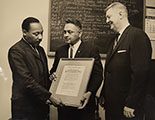
Charles Toney early 2000s
Charles Toney was a well-known civil rights activist in Davenport, Iowa before, during, and after the rise of the National Civil Rights Movement. Charles and his wife Ann were responsible for reviving Davenport’s chapter of the National Association for the Advancement of Colored People (NAACP), and for creating Davenport’s chapter of the Catholic Interracial Council (CIC). Charles also worked hard to make sure that diversity and inclusiveness were key values at John Deere, where he worked for 42 years. Charles and Ann’s activism show that change started on a local level and that the fight for rights was not just in the South. To find out more about organizations like the NAACP, click here.
Timeline
Check out this timeline to see how important things Charles was doing in Davenport were happening at the same time as things on the national scale! The green circles represent an event in Charles’ life, while the yellow circles represent an event in the U.S.
Charles Toney Born
August 23, 1913

Charles Toney was born in LaCrosse, Wisconsin in 1913 to Estella and Wilbur Toney. He moved to Clinton, Iowa as toddler.
Harlem Renaissance
May 1, 1930
The Harlem Renaissance was a literary and intellectual movement that fostered a new black cultural identity in the 1920’s and 1930’s. The movement encouraged self-determination and creativity in a time when racism was rampant. Famous writers to come from this era include Zora Neale Hurston, W.E.B. Du Bois, and Langston Hughes.
Charles Toney Employment
August 10, 1936

Charles Toney started working for John Deere Malleable Works.
Colonial Fountain
July 24, 1943
Charles and Ann Toney went to the Colonial Fountain ice cream shop after attending a play. The couple was denied service by Dorothy Baxter.
Marriage to Ann Palmer
December 17, 1943
Charles Toney married Ann Palmer in Davenport, Iowa.
First Issue of Sepia Record Published
September 1, 1944
Charles and Ann wrote, edited, and published a magazine called Sepia Record. This magazine served to showcase local African American community members and businesses.
Brown vs. Board of Education
December 8, 1952
The Brown vs. Board of Education was a landmark case that declared the segregation of schools into African American and white unconstitutional.
Civil Rights Act of 1957
September 9, 1957
President Dwight D. Eisenhower signed the Civil Rights Act of 1957, which, although greatly reduced by Congress, was a major factor in helping to protect the voting rights of African Americans in the United States.
March on Washington
August 28, 1963

The March on Washington was a national event that brought attention to discrimination African Americans were facing within the workplace and was an effort to help congress pass the Civil Rights Act.
JFK’s Assasination
November 22, 1963
President John F. Kennedy was assassinated while traveling through Dallas, Texas during a presidential visit. JFK was hugely influential in the introduction of the Civil Rights Act of 1964, and a strong promoter of the Civil Rights Movement. He received the Pacem in Terris award after his death from the CIC.
Civil Rights Act of 1964
July 2, 1964
President Lyndon B. Johnson signed the Civil Rights Act of 1964 shortly after it was approved by Congress. The act outlawed segregation at public places like pools, libraries, and public schools.
Dr. King is Given the Pacem in Terris Award
April 28, 1965

As president of the Davenport Catholic Interracial Council (CIC), Charles Toney awarded Reverend Dr. Martin Luther King, Jr. the Pacem in Terris Peace and Freedom award. Dr. King accepted the award in person.
Quad Cities Merit Employment
August 17, 1966

Local industries, including Deere & Co., organized the Quad Cities Merit Employment Council. Charles Toney was the first president of the council.
Martin Luther King, Jr. assassinated
April 4, 1968
Martin Luther King, Jr. was assassinated by a sniper in Memphis, Tennessee while visiting the city to help assist in a strike held by the sanitation workers in Memphis.
Director of Affirmative Action
January 5, 1972

Charles Toney challenged the management at Deere & Co. to become Director of Affirmative Action, which made him the first African American executive in the company.
Charles Toney Dies
October 31, 2009

On October 31, 2009, Charles Toney died at the age of 96. He left behind a legacy as a proud civil rights activist. His obituary can be found at the Quad Cities Times obituary pages (the link can be found on the Sources page under For Educators).
Ann Toney Dies
February 29, 2012

On February 29, 2012 Ann Toney died at the age of 92, three years after her husband Charles. Ann was a formidable civil rights activist in her own right, always working parallel to Charles in their dream for equality. Her obituary can be found on the Weet’s Funeral homepage (the link can be found on the Sources page under For Educators).
Recent Comments